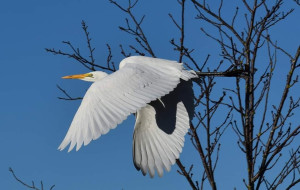Our stormwater team is thrilled at the news that a Kōtuku/White Heron has made Poutama Stream at Berryfields in Richmond its home.
That’s because we’ve been working very hard to create an ecosystem that provides habitat for our native birds and other aquatic creatures. The heron’s arrival is a sign we’re heading in the right direction with the project.
These birds only breed in one area of South Westland and then migrate to greener pastures on maturity.
These majestic-looking birds are revered for their elegant white long feathers, slender legs and long, thin S-shaped necks.
Their diet includes frogs, skinks, invertebrates, sometimes small birds and small fish, and that’s potentially when there’s a bit of a downside to having Kōtuku moving into an urban neighbourhood.
Outdoor fishponds provide a smorgasbord of tasty treats for hungry herons and we’ve had reports of goldfish being cleaned out from the Berryfields and Meadows area by our recently arrived feathered neighbour.
There are several methods suggested for protecting fish from herons.
You can provide underwater structures for fish to swim under and hide, plant densely with aquatic plants to give cover, or create bubbles in the water because a heron won’t hunt what it can’t see.
The final protective measure is putting netting over your pond.


